
Guests
- Sarah Leah Whitsonexecutive director of DAWN, an organization founded by Jamal Khashoggi in 2018 that works to reform U.S. foreign policy in the Middle East.
During a controversial Oval Office meeting last week, President Trump defended Mohammed bin Salman when a reporter asked about the Saudi crown prince’s involvement in the 2018 murder of Washington Post opinion columnist Jamal Khashoggi. “The man sitting in the White House next to President Trump is a murderer,” says Sarah Leah Whitson, executive director of DAWN, an organization founded by Khashoggi in 2018. To Whitson, Trump’s main motivation for cozying up to Saudi Arabia is financial. “The U.S. government [is] promising to deploy American men and women soldiers to defend the Saudi crown prince … in exchange for profits for U.S. companies, U.S. businesses and U.S. officials.”
Transcript
AMY GOODMAN: We turn now to the Middle East as Israel continues to carry out attacks in Gaza. Since the U.S.-brokered ceasefire went into effect, Israel has killed more than 342 civilians there, including 67 children.
In related news, Axios is reporting President Trump and Saudi Crown Prince Mohammed bin Salman had a heated discussion last week about Israel when the two met at the White House. Trump was pushing for Saudi Arabia to join the Abraham Accords and normalize relations with Israel, but the Saudi crown prince refused.
To talk about all of this and more, we’re joined by Sarah Leah Whitson, the executive director of DAWN, an organization working to reform U.S. foreign policy in the Middle East. She’s co-author of the new book From Apartheid to Democracy: A Blueprint for Peace in Israel-Palestine.
Before we talk about Gaza, Sarah Leah, I’m wondering if you can talk about this meeting at the White House between President Trump and Mohammed bin Salman. In a moment, we are going to turn to Prince Mohammed bin Salman in the White House sitting next to President Trump. He was questioned by ABC News White House correspondent Mary Bruce about his involvement in the 2018 murder of Washington Post opinion columnist Jamal Khashoggi. After condemning ABC as fake news, Trump answered by defending the crown prince. This is what he said.
PRESIDENT DONALD TRUMP: As far as this gentleman is concerned, he’s done a phenomenal job. You’re mentioning somebody that was extremely controversial. A lot of people didn’t like that gentleman that you’re talking about. Whether you like him or didn’t like him, things happen. But he knew nothing about it. And we can leave it at that. You don’t have to embarrass our guest by asking a question like that.
AMY GOODMAN: Trump’s comments contradict a U.S. intelligence report which found Prince Mohammed bin Salman ordered Khashoggi’s killing. In 2018, Khashoggi was lured into the Saudi Consulate in Istanbul, where a 15-person team, led by a close associate of MBS, drugged, murdered and dismembered Khashoggi with a bone saw.
You’ve been closely following and involved with this case, Sarah Leah Whitson. If you can comment on this meeting?
SARAH LEAH WHITSON: Well, the meeting managed to bring back into the spotlight the grim reality, which is the man sitting in the White House next to President Trump is a murderer, a murderer who our own intelligence officials verified had ordered the gruesome torture, dismemberment of Jamal Khashoggi because he had been a vocal critic of Saudi Arabia and Mohammed bin Salman.
Really, the words that President Trump used to dismiss this killing as somehow something acceptable because Jamal may have been controversial or disliked, the notion that, in fact, refuting the findings of our own intelligence agencies, and, frankly, everybody else who had been following the matter, that Mohammed bin Salman ordered this killing, was a grave disrespect to our own intelligence agencies, but also a shocking assault on our own media, effectively telling us, telling the media, telling the journalists, to shut up and not ask embarrassing questions.
Obviously, that’s the job of the media. The job of the media is to put on the spotlight the issues that politicians would rather we look away from. But Mohammed bin Salman and President Trump reminded us all that, in their view, it’s OK if we ignore the facts, it’s OK if we look the other way. And if Mohammed bin Salman is going to come with gifts of $600 billion for the U.S. economy, we should all just shut up and take it.
JUAN GONZÁLEZ: And, Sarah Leah Whitson, this visit of MBS to the United States comes, obviously, as the Trump — as Trump’s family is conducting all of this business with Saudi Arabia. Could you talk about this? For instance, the black-tie dinner for MBS at the White House that was attended by all of these CEOs — Elon Musk, Amazon’s Jeff Bezos and Apple’s Tim Cook. Well, talk about the Trump business interests in that country.
SARAH LEAH WHITSON: Sure. Trump’s family have had business interests in Saudi Arabia that they have dramatically expanded since the first Trump administration. As folks will recall, just a few weeks or months after leaving office, Mohammed bin Salman invested $2 billion in Jared Kushner’s startup investment fund and was the sole investor through the Public Investment Fund in this fund. He gave Steven Mnuchin, the former U.S. secretary treasury — secretary of treasury, a billion dollars just after he left office. And now with the return of the Trump administration, you know, it’s been a hogfest of investments by the Trump family, including plans to build new Trump resorts in Saudi Arabia, including individuals, Trump’s sons, Trump’s company, which he has supposedly disinvested himself from, making massive investments in Saudi Arabia.
But the rot goes very deep and very wide, because this is not just a problem of Republicans in the Trump administration. This Saudi influence, Saudi purchase of former U.S. officials, over 200 former U.S. military officials now on the payroll of Saudi Arabia, goes back years, and it’s a rot that is deep and expanding.
What is dramatically different is the massive investment of Saudi Arabia, the Public Investment Fund, controlled by Mohammed bin Salman, in nearly all aspects of the American economy, because the strategy of Saudi Arabia is a strategic deployment of capital to buy influence and control, to win over U.S. policy by buying the policymakers, to win over U.S. businesses by buying over U.S. businesses, and paid for by the American people, because what Mohammed bin Salman wants is a security guarantee from the United States. He came close to getting that. President Trump still hasn’t delivered that because of this dispute over normalization with Israel. But, effectively, this is the U.S. government promising to deploy American men and women soldiers to defend the Saudi crown prince, to defend the royal family, in exchange for profits for U.S. companies, U.S. businesses and U.S. officials.
JUAN GONZÁLEZ: And you mentioned normalization with Israel. Axios is reporting that in the Tuesday meeting between Trump and MBS, this became kind of a fraught discussion on — when it turned to the Abraham Accords and establishing relations with Israel. Can you talk about that, as well?
SARAH LEAH WHITSON: Saudi Arabia and Mohammed bin Salman have been very clear that they will not sign a normalization agreement with Israel until there’s an actual, detailed, credible pathway for Palestinian statehood. I think President Trump thought that the vague, illusory language of the peace plan, the so-called peace plan that he’s put forward, that is now the basis of the U.N. Security Council resolution, would be enough to paper over the actual absence of any kind of a plan for Palestinian statehood. But the Saudis didn’t buy it, and the Saudi leadership has made clear that even Mohammed bin Salman, the absolute dictator of Saudi Arabia, cannot withstand a challenge like this to his own population, which strongly supports the Palestinian people. Saudi Arabia was reminded, has been reminded in the wake of the genocide of Gaza, the ongoing genocide, that the Saudi people abhor the violence against Palestinians, and that not even his dictatorship can withstand normalization with Israel. It would be a threat to him and his ability to continue as dictator in Saudi Arabia, should he make peace or normalize with Israel under these circumstances.
This is really the Israeli government, the extremist Israeli government, sabotaging itself, refusing to even give Mohammed bin Salman throwaway words, throwaway promises of a two-state solution, because they are so strongly opposed to it that they will not make the — make even those throwaway words and secure normalization with Saudi Arabia. I think their calculation was that they can give them a few crumbs in this peace plan and get there, but clearly the Saudis rejected that, and that wasn’t enough. And so, as a result, no defense agreement was concluded.
But I expect that this issue is going to continue to arise, because the Saudis are going to continue to develop stronger ties with China, stronger military ties with China, and potentially Russia, and, of course, other European states, unless there is a commitment from the United States for a defense agreement, which is their number one priority.
AMY GOODMAN: Sarah Leah Whitson, I wanted to talk to you about your book. The latest news in Gaza, the U.N. says Israel’s war on Gaza has created a “human-made abyss” that will cost more than $70 billion in reconstruction over several decades. According to the U.N. report, from 2023 to '24, Gaza's economy contracted 87%, leaving gross domestic product per capita at $161, among the lowest in the world. This comes as Israel repeatedly violates the U.S.-brokered ceasefire. At least 342 Palestinians have been killed since the truce on October 10th. And there’s a new study from the Max Planck Institute for Demographic Research in Germany that says the death toll in Gaza likely exceeds 100,000 people, way higher than the Palestinian Health Ministry has said. If you can talk about this in the context of the new book you just wrote with Michael Schaeffer Omer-Man called From Apartheid to Democracy: A Blueprint for Peace in Israel-Palestine?
SARAH LEAH WHITSON: Well, the new U.N. Security Council resolution is exactly the problem that we’re trying to solve, which is this failed approach to actually come up with a plan to address the real problem for Israel-Palestine, and that is Israel’s illegal occupation and apartheid rule. These piecemeal efforts that treat Gaza as a separate, distinct problem, that treat the problem as Palestinians and how to rule over them, is never going to succeed. And we all know that the two-state solution process proposed by the Oslo agreements have failed. And in this void, we have the ability of Israel to maintain its permanent occupation, its permanent state of war.
So, what my book with Michael Omer-Man attempts to do is to come up with a new plan, a new blueprint for how to bring peace and security to Israel-Palestine. It includes the establishment of a transitional government — and obviously, we’re faraway off from Israelis agreeing to that — but a transitional government with the priority of ending Israeli occupation and apartheid and creating a ground of democratic rule between the river and the sea in Israel-Palestine that will allow the people who live there to democratically decide, as they should in anywhere on the planet, what they want their future governance to look like. But it prioritizes ending Israeli crimes of occupation and apartheid ahead of the secondary questions of governance, and it demands that those questions of governance, whether there should be one state or two states, binational confederation, should only be resolved by the people who actually live in the territory of Israel-Palestine.
AMY GOODMAN: Sarah Leah Whitson, talk about — more about the framing of what’s happening, both in Gaza and right now the escalating violence against Palestinians in the occupied West Bank, as your framing of apartheid.
SARAH LEAH WHITSON: Well, the fact of apartheid in Israel-Palestine is really the starting point of our book. We recognize that there is a one-state reality. Numerous writers have described the one-state reality, which is an apartheid reality, which is Israel as the sovereign ruling in a fashion that constitutes apartheid. Now, this is the conclusion that has been reached by nearly every human rights organization that works on the matter, legal experts that work on the matter. And that is the problem we’re trying to end.
The International Court of Justice has concluded, last year, that Israel’s occupation is illegal and must come to an end. The U.N. General Assembly passed a resolution, overwhelmingly in support of a resolution that called on Israel to end its illegal occupation immediately, gave Israel a deadline of September 2025 — which it has breached — to end its occupation and remove its settlers from occupied territory.
So, the central problem that we have is that Israel continues to operate its illegal occupation and by apartheid rule. Now, since the past two years, we’ve added to that the genocidal slaughter in Gaza. So, these are the central problems. These are the central crimes that must end and must end conditionally.
The problem with past failed approaches, like the Oslo process, is that they conditioned ending Israeli crimes of occupation, of apartheid, on some negotiated peace solution, on some agreement over governance, and put the onus on Palestinians to have better governance, new governance, different governance, conditions that, of course, Palestinians would inevitably never meet because of the structure of the Palestinian Authority as, effectively, an agent of the occupation and an administrator of the occupation in certain parts of the West Bank.
And that is the approach that our book rejects. We say that, first, occupation and apartheid has to end, and, second, that only the people living between the river and the sea should democratically decide what their future governance looks like, whether one state or two states.
The essential problem is one that the United States refuses to deal with and refuses to address. The United States matters, because it is the principal backer of Israel, and without U.S. military and diplomatic and political support, Israel’s occupation and apartheid rule would have ended decades ago.
What we’re hoping for is to offer an off-ramp, an off-ramp for peace, an off-ramp for security for all of the people — Israeli Jews, Palestinians, other minorities living between the river and the sea — should Israeli Jews want an off-ramp that will see an end to their global isolation, increasing sanctions against them, inability to live in peace and security, permanent war footing, endless wars. I can’t imagine that this is something that Israeli Jews want for their future.
But really, the only two options that remain now is either the full displacement and eradication of Palestinians, which is what the current Israeli government has been seeking to do, as we’ve seen in Gaza, as we are seeing in the West Bank, or an alternative, an alternative, detailed approach for how to bring democratic rule between the river and the sea and allow people to do what we do in democratic countries around the world, which is choose our government.
AMY GOODMAN: Sarah Leah Whitson, we want to thank you for being with us, executive director of DAWN, an organization working to reform U.S. foreign policy in the Middle East. She’s written a new book. It’s co-authored with Michael Schaeffer Omer-Man. It’s called From Apartheid to Democracy: A Blueprint for Peace in Israel-Palestine.
Coming up, Dean Fuleihan, who has been picked by New York Mayor-elect Zohran Mamdani to serve as his deputy mayor and help carry out his affordability agenda. Then we’ll speak with Bishop Barber. Stay with us.
[break]
AMY GOODMAN: Zeshan B covering “You Don’t Miss Your Water” in our Democracy Now! studio.

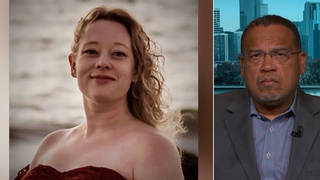
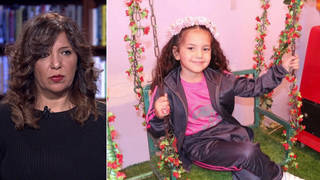
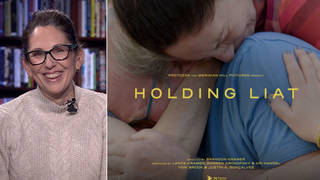
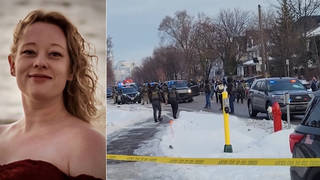
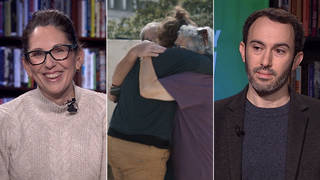

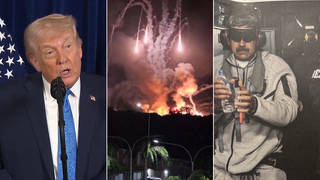
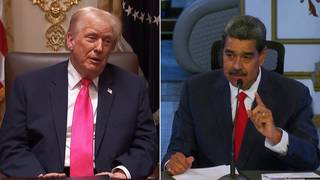

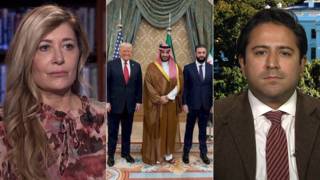

Media Options